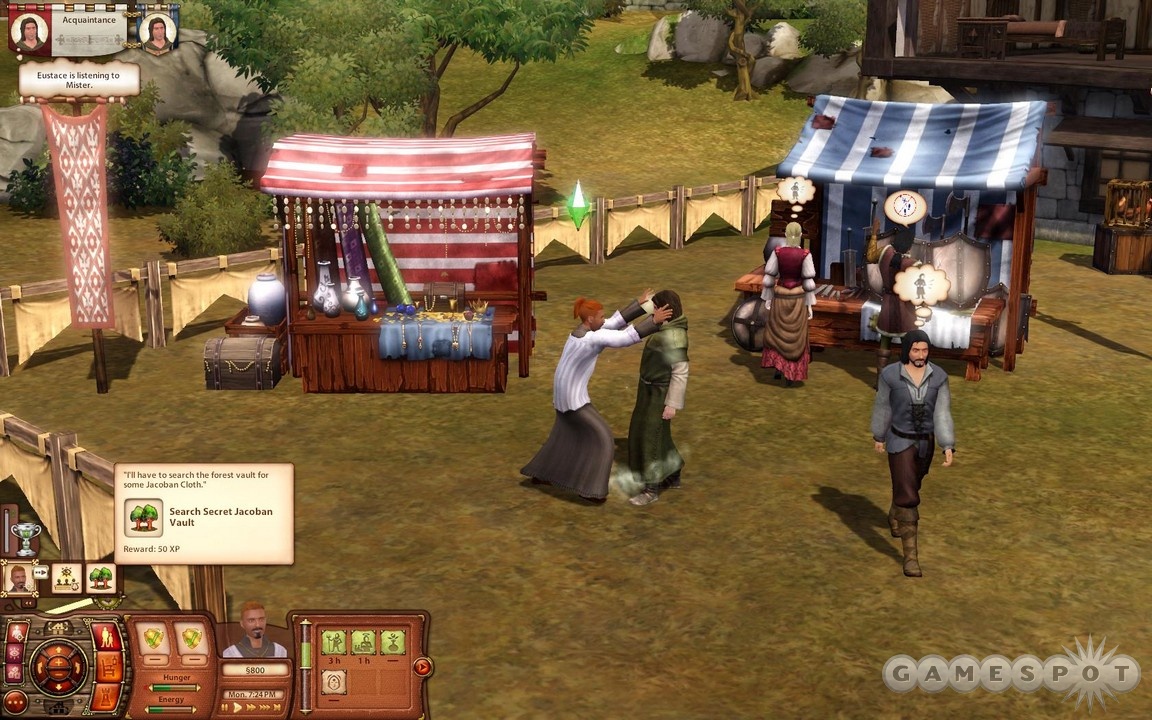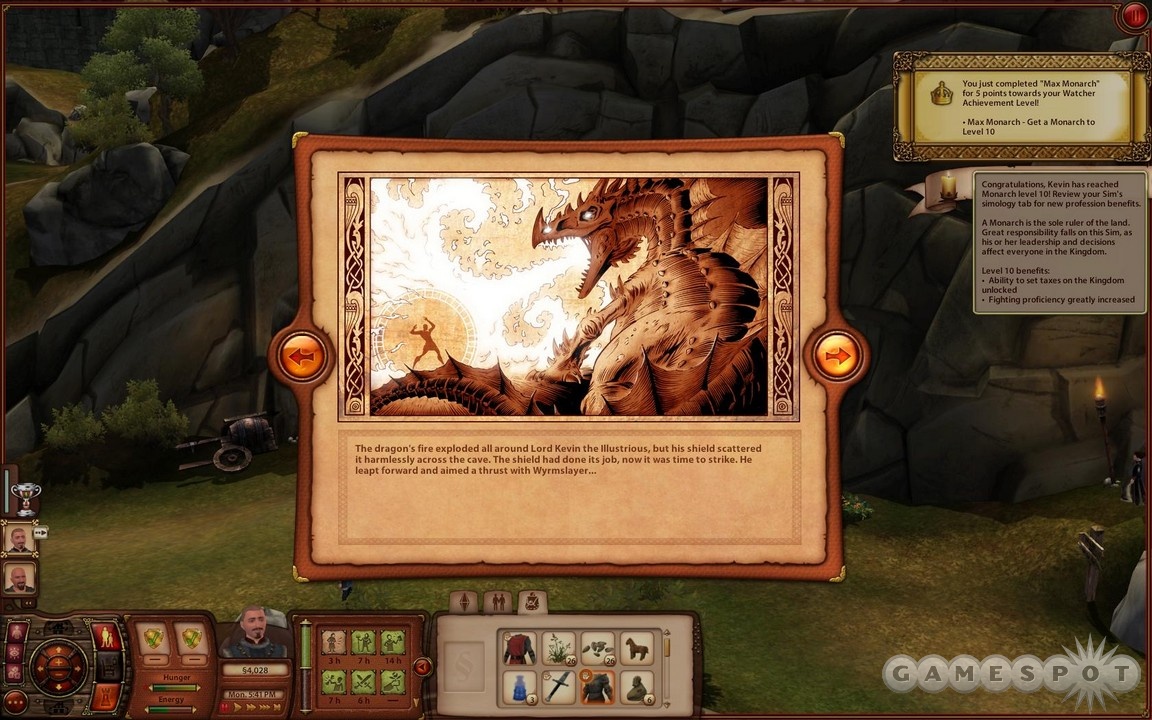The Sims Medieval brings some irony to this popular series of life simulations. Whereas the proper Sims games make the mundane aspects of everyday life interesting, this Renaissance faire spin-off takes interesting concepts and makes them mundane. It's initially entertaining, fueled by the peculiar charms that have always made these games so delightful. But eventually, the pleasures of calling the local bard a lack-witted cur are undercut by the sensation that you're just treading water and never really getting anywhere. Of course, you could say this about those previous Sims games, but their joy came from your ability to make a life as worthy as you liked. Just as your little digital people built relationships with each other, so you built relationships with them, and the stories you played out in the game were born of your own imagination. In The Sims Medieval, you don't play out your own stories--you play out someone else's. And you do so over and over again in a weird computer-game version of Groundhog Day. The first 10 hours or so are pleasant ones, and some worthwhile ideas work out rather well. But in the end, The Sims Medieval lacks imagination--and it lacks the tools to let you flex your own.
The game begins by letting you create a sim called a hero; in this case, your hero is a monarch in charge of a kingdom. Your king (or queen) doesn't have an enormous selection of outfits to choose from, but this is more like Ye Olde Sims, so you wouldn't expect a plethora of sunglasses and tank tops. Luckily, the create-a-style feature from The Sims 3 returns, which lets you customize those garments using various patterns and colors. So, at least initially, you get a taste of that dollhouse appeal you expect coming into the game. You gussy up your monarch, give him or her a couple of traits (fun loving, vain, and so forth) and a fatal flaw (perhaps gluttony or hubris). Then you head to your castle, where you might expect to find raucous adventures or, at least, a chance to exercise your decorating skills.
As it turns out, you find both, but not in ways you might have expected. Your first tasks are to collect flowers, write laws, and defeat a giant bear--an eclectic array of activities for the kingdom's ruler, to be sure, though this introduction is expanded upon in due time. After the multi-hour tutorial (during which, incidentally, you cannot save your game), you are whisked to a kingdom view, where you get the chance to add a new structure to your land and possibly a new hero to create along with it. Some structures, such as the lighthouse, don't come with a new sim. But if you build a wizard's tower, you get to create a wizard to live within it. If you go for the barracks, you get to design a knight to enjoy it. Each of these heroes can interact with various objects, and each other, in typical Sims fashion. Sidle up to locals and get to know them. (Or spit in their faces, if you fancy your sim one of those aforementioned curs.) Head to the fireplace and whip up some vegetable stew or bear meat soup. Head to the docks or to a local stream and see if you can catch a few fish. You can also use a chamber pot, take a bath, or enjoy the tunes from a music box, but you don't need to give the usual basic needs too much concern: The only such needs you're required to meet are hunger and energy.

Different heroes get entirely different sets of skills outside of these basics, however. Take the Peteran priest. She can convert locals to the Peteran faith, deliver sermons, pray, and evangelize out in front of the church. Your doctor collects leeches from streams, gathers herbs and flowers, and treats citizens in a creepy-looking contraption. Some of these new elements are fun to play with and exude the usual Sims silliness and tongue-in-cheek melodrama. The bard, for example, writes poems and recites them to others. To make him do so, you have him talk to other sims for inspiration, visit the docks and ponder the night sky, or just hang around the forest. Once he has a variety of subjects to write about, you send him to his desk and choose what subjects to write about, and he puts pen to paper. Or perhaps you'd rather he write a play. In this case, you follow a similar procedure, but once the play is complete, you recruit an actor, and the bard and his protege act out this comedy or tragedy on the stage at the local tavern. It's a joy to watch this little play come to life, with the sims hamming it up like community theater thespians taking on Macbeth.
These are neat twists on the Sims formula, and at first, they're different enough and entertaining enough to inspire the benefit of your doubt. Each campaign (called an ambition) is divided into a series of quests, which you choose from a list after you complete the latest one. Quests have you controlling one or two sims, using these skills to find out, for example, what disease might be affecting the populace or where you might find a proper suitor for the queen. When taking on a quest, you might be given multiple ways to approach it. An evil witch has returned. Do you marry her, rob her of her power, or kill her off for good? Only certain sims (or pairs of sims) can carry out certain paths, so the king takes the marriage path, whereas the wizard (or the physician, or the priest) takes the power-robbing path. From here, you control one or two heroes and perform individual tasks that lead to quest completion. This means having the blacksmith forge weapons, the merchant trade in faraway lands you never get to see, and the bard write a play so magnificent that the local critic declares it a perfect work of art. As they write, study, and pray, your heroes level up, opening up new possibilities. (Make armor faster! Fight more effectively!)
There are moments within each quest in which you get to choose how to proceed, and these are legitimately interesting. Do you ask the queen's advisor for guidance, or do you search for clues on your own? Do you choose a gender for your monarch's child, or do you leave it to chance? The quest might play out differently, depending on what you decide, though some decisions are less significant. For instance, when your king holds court, a citizen may ask for permission to have a child. You could offer your blessing or treat the citizen with disdain, which is a neat touch--the first time. But when you hold court a few times, and these folks eventually ask you the same questions ad nauseam, you can only decide whether to tax goat milk so many times before you tire of it. When the same beggar approaches you as you leave the market time and again, and the same dream interrupts your sleep, it stops being a cute diversion and becomes an annoyance.
It's unfortunate, given the series' pedigree, that the moment-to-moment gameplay gives you so little room to be creative. Rather, it pushes you from one very specific task to another, and it punishes you when you exercise some freedom. Should you spend too much time doing something other than assigned activities, you receive fewer renown points (used to purchase new structures) when completing your quest. In addition, you need to keep your heroes focused. The more focus they have, the greater the chance of completing a successful task. And the easiest way to earn focus is to complete two additional specific activities each day, like healing a patient (if you're a doctor) or mining for gems (if you're a blacksmith). And, so, instead of creating a family and living a dream, your sims are chained to specific deeds like slaves. (Shirking these responsibilities can even get a sim sent to the stocks.) And you as the player are no longer the puppeteer but rather the puppet yourself, and you're rewarded only for doing what the game wants you to do. How odd that the opening cinematic informs you that you are playing The Maker--that is, God--when, in fact, you are now more of a middle manager, telling your sims to do what the game demands of you, not what you want them to do.
The game's large-scale structure merely accentuates this monotony. Each time you begin a new ambition, you start with a blank slate in the exact same kingdom. Everything is in the same place--the plants you pick, the ore you mine, the graveyard your dead father haunts. And you perform many of the same quests as well. Granted, the opportunity to complete them differently freshens things up a bit, but it's never enough to make all of this content feel like more than a 15-hour game stretched to what seems like infinity. Eventually, you use the time-manipulation feature to speed through almost every individual task just so you can see how things play out. And once you're done, you realize that you didn't have an adventure--you were only told of one. In previous Sims games, your journey might only have been a vacation to the beach or a picnic at the park, but it was still one you experienced and molded. In The Sims Medieval, you don't see the epic battle between your knight and a dragon; you learn of the details in a quest update. The only battles you experience are presented like any other social or object interaction--they just involve the slicing of swords rather than the flapping of gums.

If you like Sims games for their creation aspects, you will be disappointed to learn that you don't get to build your castle from the ground up. You can decorate interiors with wall hangings, toss in some barrels, change wall and floor textures, and buy a fancy claw-footed bathtub for your hoity-toity merchant. There's a good selection of decorative and useful items alike to purchase, so the cathedral and monastery can look as holy--or as intimidating--as you like. What you can't do is add walls or tear them down. There is no true building element to The Sims Medieval. This dollhouse only allows you to play as interior decorator, but not as castle architect. Even the camera is limited here, forcing you into a cutaway view rather than allowing you to rotate around your handsome interior. The camera is an issue in other ways as well. It swoops about cinematically when you want to move quickly to the village square or local forest, but it gets stubborn as you pan across the terrain.
The Sims Medieval is an interesting, and initially enjoyable, mixture of life simulation and role-playing game. But this is an uneasy partnership. The RPG facet has you doing all the busywork to prepare for epic quests you never experience for yourself. The Sim aspect, meanwhile, limits too many of the features that give this series its unique identity. Creating spells with your maniacal wizard, bleeding sick patients with leeches, and sermonizing at the cathedral's pulpit are all smart new activities that lend a bit of freshness to the Sims formula. But these additions are overshadowed by the forced grind that comes from leading these heroes through lives of indentured servitude.